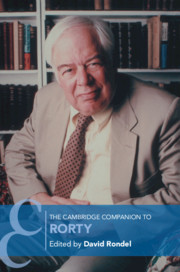Book contents
- The Cambridge Companion to Rorty
- Cambridge Companions to Philosophy
- The Cambridge Companion to Rorty
- Copyright page
- Contents
- Contributors
- Abbreviations of Works by Rorty
- Introduction: The Unity of Richard Rorty’s Philosophy
- 1 Rorty’s Metaphilosophy: A Pluralistic Corridor
- 2 After Metaphysics: Eliminativism and the Protreptic Dilemma
- 3 Rorty and Classical Pragmatism
- 4 A Pragmatism More Ironic Than Pragmatic
- 5 Rorty and Semantic Minimalism
- 6 Returning to the Particular: Morality and the Self after Rorty
- 7 Rorty’s Political Philosophy
- 8 Tinkering with Truth, Tinkering with Difference: Rorty and (Liberal) Feminism
- 9 Rorty’s Insouciant Social Thought
- 10 Rorty and National Pride
- 11 Rorty on Religion
- 12 Rorty: Reading Continental Philosophy
- 13 Rorty’s Literary Culture: Reading, Redemption, and The Heart’s Invisible Furies
- 14 Wild Orchids
- Bibliography
- Index
- Cambridge Companions to Philosophy
3 - Rorty and Classical Pragmatism
Published online by Cambridge University Press: 13 April 2021
- The Cambridge Companion to Rorty
- Cambridge Companions to Philosophy
- The Cambridge Companion to Rorty
- Copyright page
- Contents
- Contributors
- Abbreviations of Works by Rorty
- Introduction: The Unity of Richard Rorty’s Philosophy
- 1 Rorty’s Metaphilosophy: A Pluralistic Corridor
- 2 After Metaphysics: Eliminativism and the Protreptic Dilemma
- 3 Rorty and Classical Pragmatism
- 4 A Pragmatism More Ironic Than Pragmatic
- 5 Rorty and Semantic Minimalism
- 6 Returning to the Particular: Morality and the Self after Rorty
- 7 Rorty’s Political Philosophy
- 8 Tinkering with Truth, Tinkering with Difference: Rorty and (Liberal) Feminism
- 9 Rorty’s Insouciant Social Thought
- 10 Rorty and National Pride
- 11 Rorty on Religion
- 12 Rorty: Reading Continental Philosophy
- 13 Rorty’s Literary Culture: Reading, Redemption, and The Heart’s Invisible Furies
- 14 Wild Orchids
- Bibliography
- Index
- Cambridge Companions to Philosophy
Summary
Despite his role in pragmatism’s resurgence, when it comes to classical pragmatism Rorty’s work has blocked the road of inquiry. His selective interpretations spurred sharp lines of demarcation distinguishing “classical” or “paleo” pragmatism from its “neo” and “new” offspring to protect both classical and new pragmatisms alike from Rorty’s distortive readings. This chapter seeks to move contemporary pragmatism beyond these impasses by investigating largely unexamined avenues of shared commitment between Rorty and Peirce, Dewey, and James. I argue that Rorty is best read as reconstructing classical pragmatism rather than misunderstanding it. After establishing Rorty’s underappreciated early engagement with pragmatism, I trace the influence of Peirce on Rorty’s thought, which includes a commitment to language and to a distinct form of realism which was later obscured. Recognizing Rorty’s notion of “philosophy as cultural politics” as a close relative of Dewey’s conception of philosophy as cultural criticism yields complementary insights overshadowed by the experience vs. language debate. I then elucidate the shared ethics of belief that emerges from James’s “unfinished” universe and Rorty’s recognition of contingency to guide their commitments to agency and a conception of knowledge in which humans are active participants in the construction of what is right and true.
- Type
- Chapter
- Information
- The Cambridge Companion to Rorty , pp. 67 - 87Publisher: Cambridge University PressPrint publication year: 2021



